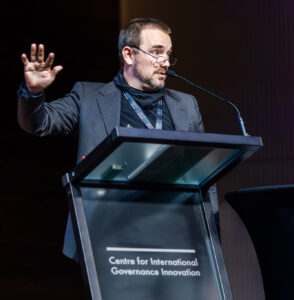York University’s Institute for Technoscience & Society (ITS), established in 2022 as an Associated Research Centre of the new Connected Minds: Neural and Machine Systems for a Healthy, Just Society initiative, is on a mission to build a global hub focused on the complex relationship between technoscience – the scientific study of how humans interact with technology – and society. In particular, the institute is committed to unravelling the configuration of social power that underpins science, medicine, technology and innovation.
According to Professor Kean Birch, the inaugural director of ITS, the institute was established to cement York’s international standing and reputation in disciplines such as science and technology studies, communication and media studies, design, critical data studies, the history and philosophy of science, and other related fields in which York is a global leader. Aligned with the University’s Strategic Research Plan, especially when it comes to the topics of digital cultures and disruptive technologies, its members are actively engaged in research on the social, political, and economic implications of artificial intelligence (AI) and neuroscience.

Birch is enthusiastic about the future of research in this area: “We’re seeing a lot of interest in these topics,” he says, “especially in the societal implications of emerging technologies like artificial intelligence and other digital technologies.”
He insists, however, the institute’s depth in expertise is not limited to those areas, extending into topics such as the history of science through games design, the global governance of biotechnology and pharmaceutical innovation.
To support this diversity of knowledge, ITS is organized into the following four research clusters to help create synergies and support collaboration:
- Technoscientific Injustices, which deals with the implications of emerging technoscience, its impacts on different social groups, and how to create just and inclusive science and technologies;
- Technoscientific Economies, which deals with the entanglement of science and with different economies, what kinds of innovation get promoted by which kinds of economy, and how to support responsible and inclusive innovation;
- Technoscientific Pasts & Futures, which deals with how the future of science and technology is bound up with our pasts and how the past helps us to build hopeful visions of and policies for the future; and
- Technoscientific Bodies & Minds, which deals with the societal implications of prevailing understandings of health risks, diseases, and health-care delivery, as well as how prevailing understandings reinforce social injustices, inequities and divisions.
The institute is making its impact known in Canadian debates about the role of science and technology in society. Recently, Birch was interviewed by the CBC about the U.S. Department of Justice lawsuit against Apple Inc. for antitrust violations; and his recent opinion pieces about personal data as a collective asset and the social costs of generative AI were published in the Globe and Mail.
ITS plans to continue on this trajectory through regular events and policy briefing papers, as well as interventions in public and policy debates.
“York is incredibly well-placed to make an important social, political, and economic impact when it comes to these issues,” explains Birch, “because of the institutional strength and expertise of faculty and early career researchers here.”


